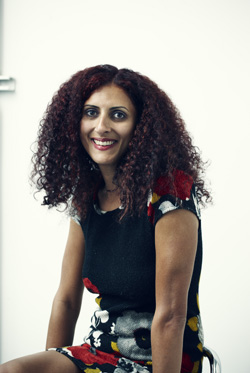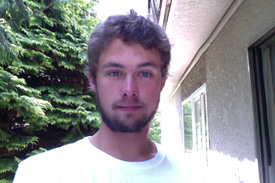The Brain of a Poet: Jack Crouch
in Conversation with Priscila Uppal

Photo credit: Daniel Ehrenworth
Malahat volunteer Jack Crouch talks with Priscila Uppal, judge of the 2014 Constance Rooke Creative Nonfiction Prize. Read on to see what Priscila has to say about her upcoming work, and reasons why you should enter this year's CNF contest.
Tell us about yourself. Has writing been the uttermost passion your entire life, or did you have a moment of self-discovery during adolescence that led you on your path?
Writing has always been a part of my life. It is my way of confronting the world and asking questions of it. I have always written poems and stories since as far back as I can remember (even instructing my stuffed toys to do the same when I would play “teacher” with them). I filled dozens of notebooks (since destroyed) before the end of high school. I also wrote a novel about psychic twins (also destroyed). But I had never met a writer. A writer had never visited my school. When I went to university to study English Literature and Creative Writing, I had no idea that I would end up a published author before completing my degree. I was under the impression that all writers were dead. Most likely also white and male. But university opened my eyes to the possibility that I could write as an occupation, fulfilling my vocation.
One important part of your work is poetry. What attracts you to writing poetry and what has it taught you?
I have the brain of a poet and I think I approach everything I do as a poet. What I mean by this is that I think in terms of metaphorical connections—connections between dissimilar things. The best poets make us see our lives and the world in new ways. Their words imprint themselves into our consciousness, on our bodies, in our brains. Poetry continues to teach me about what matters, about what absolutely must be said no matter what the consequences, about how words can leap out from the page and change who you are, about the infinite possibilities of the imagination.
What projects are you working on right now?
I have a book of short stories, Cover Before Striking, coming out with Dundurn Press in February 2015. Also, a book of poems in November 2014. And my play, 6 Essential Questions, will be published in the fall of 2015. In terms of generating new material, I’m working on a new play and a new creative project that is impossible to define generically. It’s a busy time ahead!
What do you find interesting, motivating, or appealing about creative nonfiction, and what are some of your experiences with this genre?
I never wanted to write a memoir before Projection: Encounters with My Runaway Mother (Dundurn, 2013). I’ve always been more interested in what might have happened, or could have happened, or should have happened, instead of what actually happened. But my reunion with the mother was an opportunity to analyze and investigate a lot of subjects I find very interesting—sentimentality around mothers and daughters, different types of trauma, different ways of using and abusing art, narratives of reunion. But it did take some time for me to discover the right structure for the book: one chapter, one day of the trip, one movie. My mother is a film critic and uses movies to live her life (literally and fantastically), so I found the frame of movies was essential to translating the experience of living with someone who had worked out a script about me, how I am, and how we should act together, even though she had abandoned me, my brother, and our quadriplegic father 20 years before. Telling the truth about this story was essential, for me, but also for my readers.
Being the judge of the 2014 Constance Rooke Creative Nonfiction Prize, what key criteria do you believe will help guide writers in the right direction to become a possible winner?
The word “Creative” is key, to me. I don’t want to feel like I’ve read this exact story before told in the exact same way. I want to have my assumptions challenged—culturally, politically, socially, aesthetically, philosophically. I want to be able to take the winning piece in my hand and say, “I now have a completely different take on this subject.”
What do you believe contests like this one do for Canadian literature? As a contestant yourself in previous literature contests, can you talk about some of the benefits of submitting?
Contests help people finish projects. They give your words a concrete, specific place to go. They also help readers find new voices. When you win a contest, your confidence goes up, not because someone thought your work was better than someone else’s, but because you realize you are being read, and read with sympathy and care. We write to be read in the end. That’s what contests do. They help writers find readers and readers find writers. And sometimes they give the writer a little money they need to keep writing, which is also a great gift that goes beyond financial reward.

Jack Crouch
* * * * * * * *
Read full contest details about this year's Creative Nonfiction Prize.









